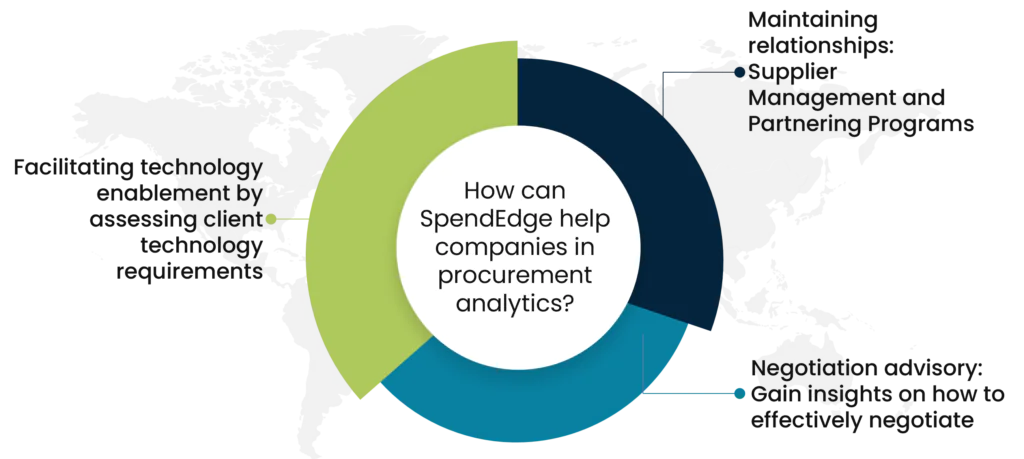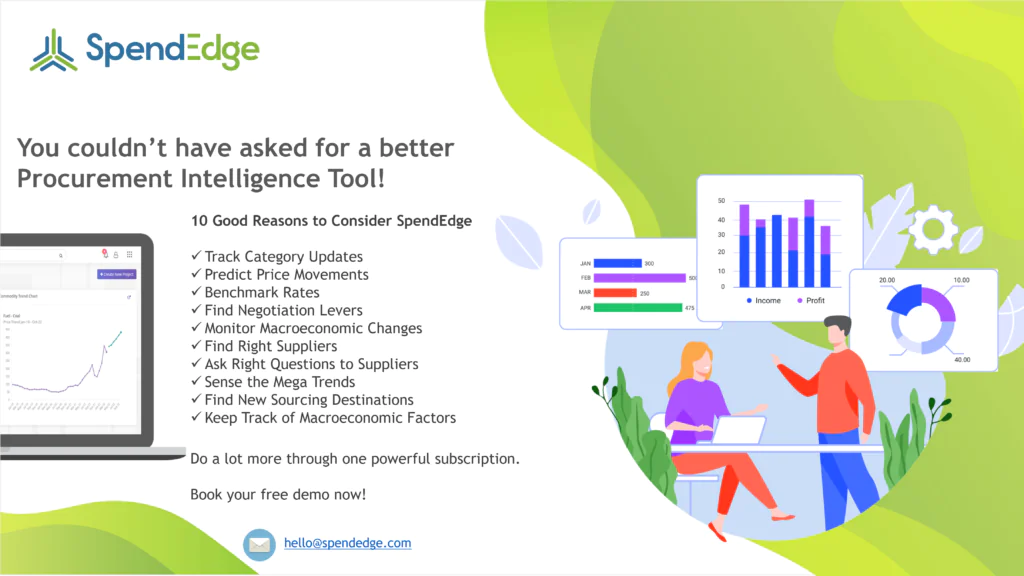By: George Mathew
The implication of analytics in procurement can benefit the procurement process by improving the working of its operations. Procurement analytics uses data analysis and technology to gain insights and optimize the procurement and supply chain functions within an organization. It involves collecting and analyzing data related to purchasing, supplier performance, cost management, and other relevant factors to make informed decisions, enhance efficiency, reduce costs, and improve the overall procurement process.
Procurement analytics plays a crucial role in enhancing supply chain management through various means. It enables businesses to make data-driven decisions by assessing historical procurement choices, tracking trends, and evaluating supplier performance. These insights result in improved supplier relationships, more effective cost management, and quicker response times. Furthermore, procurement analytics assists in pinpointing vulnerable segments in the supply chain, enabling proactive risk mitigation measures.
To implement procurement analytics, collect and integrate procurement data, set clear objectives, and define key metrics. Utilize analytics tools to gain insights into supplier performance, cost optimization, and risk management. Implement findings to enhance procurement strategies, supplier relationships, and supply chain efficiency.
How can procurement analytics enhance and streamline the buying process?
Enhance supplier performance effectively:
Enhancing supplier performance effectively involves leveraging data-driven solutions and fostering collaborative partnerships. By analyzing supplier data, businesses can identify areas for improvement, such as delivery times, quality, or pricing. This data-driven approach enables constructive dialogues with suppliers, as specific issues and opportunities are addressed. Collaborative partnerships are built on transparency and mutual goals. Together, both parties can work to optimize processes, reduce costs, and ensure timely deliveries, resulting in a more productive and mutually beneficial supplier relationship.
Implementing data-based business strategies and predicting future spend:
Facilitating strategic sourcing efforts involves deploying data-driven methodologies to enhance business strategies and anticipate future expenditures. This encompasses the systematic analysis of procurement data to identify cost-saving opportunities, optimize supplier relationships, and forecast future spending trends. By harnessing data and predictive analytics, organizations can make informed decisions that result in more efficient procurement processes, reduced costs, and improved overall competitiveness, ultimately aligning their sourcing practices with long-term strategic goals.
Advanced analytics to mitigate risk and enforce compliance:
Employing advanced analytics and predictive analytics tools enables organizations to proactively manage and mitigate risks while also bolstering compliance efforts. These tools assess historical and real-time data to identify potential risks in the supply chain, such as supplier reliability issues or market fluctuations. Moreover, they streamline requisition and invoicing procedures, ensuring adherence to regulatory requirements. This not only reduces the likelihood of costly compliance breaches but also enhances overall risk management, safeguarding the organization’s reputation and financial stability.
Better benchmarking: Evaluating internal spend data and external economic influences
Better benchmarking involves the continuous evaluation of internal spending data alongside the influence of external economic and market factors in real time. This process allows organizations to compare their expenditures and performance against industry standards and competitors. By analyzing their own spending patterns and tracking external factors like market trends and economic conditions, businesses can make data-driven decisions to optimize their operations, identify cost-saving opportunities, and enhance competitiveness. Real-time monitoring enables quick adjustments to stay in line with best practices and respond effectively to changes in the business environment, fostering continual improvement.
Explore innovative pathways to accomplish ESG objectives:
Exploring innovative pathways to achieve Environmental, Social, and Governance (ESG) objectives involves leveraging data-driven approaches to identify and collaborate with a wider range of suppliers who share sustainability goals. By analyzing supplier data, organizations can pinpoint potential partners that align with ESG criteria, such as environmentally friendly practices, social responsibility, and ethical governance. This not only diversifies the supply chain but also promotes sustainable business practices. It allows companies to not only meet their ESG goals but also contribute to broader sustainability efforts, enhancing their reputation and fostering positive social and environmental impacts.
How can SpendEdge help companies in procurement analytics?

Maintaining relationships: Supplier Management and Partnering Programs
SpendEdge experts can significantly enhance supplier management and partnership programs by conducting a thorough supplier identification process, followed by a comprehensive evaluation of their capabilities. By leveraging extensive data analysis, we provide valuable insights into supplier performance, reliability, and suitability for specific business needs. This data-driven approach allows for informed decision-making, aiding in the selection of high-quality suppliers. Additionally, We offer strategic recommendations for forging successful partnerships, which can lead to improved cost-efficiency, supply chain resilience, and overall business success.
Facilitating technology enablement by assessing client technology requirements:
SpendEdge assists in technology enablement by first gaining a deep understanding of the client’s specific technology requirements. This involves close collaboration to identify their unique needs and objectives. Next, SpendEdge conducts a compatibility audit to assess the existing technology infrastructure and systems in place. This audit helps pinpoint any gaps or areas for improvement. Based on this assessment, SpendEdge then collaborates to design and develop a tailored application architecture that aligns with the client’s business goals and technology needs.
Negotiation advisory: Gain insights on how to effectively negotiate
Our negotiation advisory services can help you save time and resources that can be used to focus on your core responsibilities. We assist in identifying opportunities such as cost savings, better contract terms, or added incentives that can help maximize your company’s value. This enables you to negotiate with more confidence and bargaining power, resulting in increased value derived from your negotiations. Our negotiation advisory services also provide long-term cost savings by identifying ways to reduce expenses, improve terms, and secure favorable deals. The data generated can be used to negotiate for better pricing and payment conditions.
Success story: Here’s how SpendEdge helped a global oil and gas company in enhancing its procurement efficiency
Our client is a global oil and gas company that uses procurement analytics to improve operations. They were facing challenges in the efficient management of procurement operations, a lack of clarity regarding their technology needs and application architecture, and difficulties in supplier negotiations and pricing strategies, as well as aligning their procurement practices with ESG goals.
Our experts at SpendEdge implemented advanced procurement analytics tools to streamline the procurement process and utilized data analytics to identify patterns, optimize supplier selection, and improve procurement timelines. Our experts also conducted a thorough analysis of the client’s technology needs. Performed a compatibility audit to identify gaps and areas of improvement in the existing infrastructure and developed a customized application architecture tailored to the company’s requirements, ensuring seamless integration and efficiency. Additionally, to improve supplier negotiations, our specialist advisors assisted the client in understanding which pricing models would be most beneficial for their procurement needs, resulting in more favorable agreements with suppliers.
Our solutions helped the client to successfully transform their procurement operations and resolved compatibility issues within the technology infrastructure, leading to increased operational efficiency and reduced downtime, as well as helped in gaining valuable insights into supplier negotiations, resulting in more favorable pricing models and agreements.

Contact us now to solve your procurement problems!
Author’s Details
George Mathew
Associate Vice President, Sourcing and Procurement Intelligence
George is a procurement specialist at Infiniti Research and provides advisory services to clients across the pharmaceutical, CPG & FMCG, energy, and automotive sectors. He specializes in the procurement areas of industry benchmarking, cost modeling, rate card benchmarking, negotiation advisory, and supplier intelligence.




